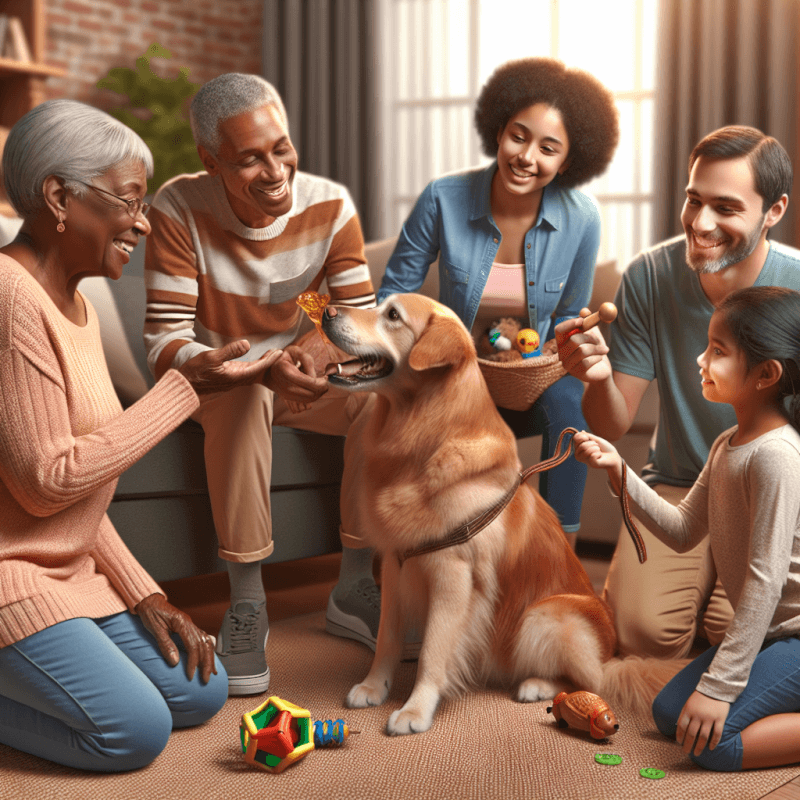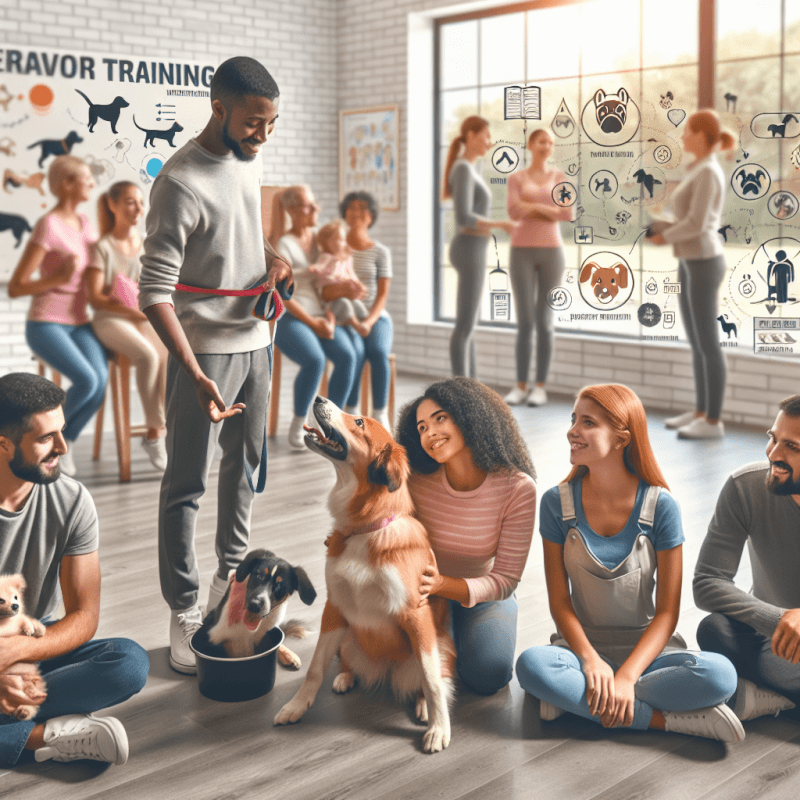If you’ve been struggling to train and manage your four-legged family member, then look no further than the Family Dog Training And Behavior Center. This comprehensive facility is dedicated to helping you and your beloved pooch develop a strong bond while addressing any behavioral issues you may be facing. With their experienced trainers and innovative methods, the Family Dog Training And Behavior Center is a haven for both new and experienced dog owners seeking effective training solutions. Say goodbye to those frustrating moments and embark on a journey of harmonious companionship with your furry friend at this outstanding center.

About Family Dog Training And Behavior Center
Mission and values
At Family Dog Training And Behavior Center, our mission is to help dogs and their owners build a strong and harmonious relationship through positive and effective training methods. We are dedicated to promoting responsible dog ownership and creating well-behaved and well-adjusted dogs. Our core values include compassion, professionalism, and a commitment to improving the lives of both dogs and their humans.
Ready for Cat Trivia?
Test your knowledge about cats!

History
Family Dog Training And Behavior Center has been serving the community for over 20 years. Founded by dog enthusiasts with a passion for training and behavior, our center has grown from a small operation to a well-established and reputable training facility. Over the years, we have helped countless families overcome behavioral challenges and develop a stronger bond with their furry friends.
Facilities
At Family Dog Training And Behavior Center, we pride ourselves on providing a safe and stimulating environment for both dogs and their owners. Our state-of-the-art training facility is equipped with spacious training rooms, agility equipment, and a variety of enrichment toys. We prioritize the comfort and well-being of our furry clients, ensuring they have the best possible experience during their training sessions.
Team of trainers and behaviorists
Our team of trainers and behaviorists at Family Dog Training And Behavior Center is composed of experienced professionals who are dedicated to the well-being of dogs. With extensive knowledge in canine behavior and training techniques, our experts are committed to providing effective and personalized training programs. They are certified and continuously stay updated on the latest advancements in the field to ensure the highest quality of training for our clients.
Services Offered
At Family Dog Training And Behavior Center, we offer a wide range of services tailored to meet the diverse needs of dog owners. Whether you have a new puppy or a dog with specific behavioral issues, we have a training program that can help you and your furry friend.
Basic obedience training
Our basic obedience training program is designed to teach dogs essential commands such as sit, stay, come, and heel. Through positive reinforcement techniques, we focus on building a solid foundation of obedience, ensuring that your dog listens and responds to your commands reliably.
Behavioral problem solving
If your dog exhibits problem behaviors such as aggression, separation anxiety, excessive barking, or fear, our behaviorists can help. We assess the underlying causes of these behaviors and develop a personalized training plan to address them effectively. With patience and expertise, we work with you to modify your dog’s behavior and create a more balanced and harmonious relationship.
Puppy training
Puppyhood is a critical time for learning and socialization. Our puppy training program aims to give your puppy a head start in life by teaching them basic manners and social skills. We focus on house training, crate training, leash walking, and basic commands, setting a solid foundation for their future training.
Agility training
For dogs with energy to spare, our agility training program provides mental and physical stimulation. Through obstacle courses, jumps, tunnels, and weave poles, we engage dogs in a fun and challenging environment. Agility training not only improves their coordination and fitness but also strengthens the bond between dogs and their owners.
Service dog training
Family Dog Training And Behavior Center offers service dog training programs for dogs that assist individuals with disabilities. Our specialized training focuses on tasks such as retrieving objects, opening doors, and providing support to enhance the independence of the handler. We work closely with individuals to personalize the training to their specific needs.
Therapy dog training
If you’re interested in having your dog become a certified therapy dog, our training program can help prepare them for this rewarding role. Therapy dogs bring comfort and companionship to people in hospitals, nursing homes, and other healthcare settings. Our training focuses on obedience, calmness, and social skills necessary for providing therapeutic benefits.
Group classes
We offer group training classes that provide an opportunity for dogs to learn in a social setting. Group classes allow dogs to interact with other dogs, helping to improve their socialization skills. Under the guidance of our trainers, you’ll learn effective training techniques while enjoying the support and camaraderie of other dog owners.
Private sessions
For a more personalized approach, we offer private training sessions tailored to your specific needs and goals. Private sessions allow for focused attention on your dog’s unique challenges, whether it be basic obedience or more complex behavioral issues. Our trainers will work closely with you to address your concerns and provide individualized training plans.
Board and train programs
If you’re looking for intensive training for your dog, our board and train programs can be a great option. Dogs stay with our trainers at our facility for a designated period, receiving training and guidance throughout the day. This immersive training experience ensures consistent training and faster progress.
Workshops and seminars
At Family Dog Training And Behavior Center, we also offer workshops and seminars on various topics related to dog training and behavior. These educational events provide opportunities to learn from experts in the field, gain valuable insights, and connect with other dog owners. From puppy socialization to advanced training techniques, our workshops cover a wide range of topics to cater to different needs and interests.
Benefits of Family Dog Training
Enrolling your dog in Family Dog Training And Behavior Center can have numerous benefits for both you and your furry friend.
Improved communication
By learning how to effectively communicate with your dog, you will be able to better understand their needs and desires. Through training, you and your dog will establish clear and consistent communication, allowing for a stronger and more harmonious relationship.
Enhanced bond
Training sessions provide valuable bonding opportunities between you and your dog. Working together towards a common goal fosters trust and deepens the connection between you. The shared experiences during training can create lifelong memories and strengthen the bond you have with your dog.
Increased socialization
Through group classes and socialization opportunities, your dog will learn how to interact appropriately with other dogs and people. This exposure to different environments and stimuli will help them become more well-rounded and confident in various social situations.
Behavior modification
One of the significant benefits of training is behavior modification. Whether your dog exhibits mild behavioral issues or more severe problems, training can address and modify these behaviors. Our trainers will work with you to identify the underlying causes and develop effective strategies to bring about positive behavior changes.
Reduced stress and anxiety
Training provides mental stimulation and structure for dogs, which can help alleviate stress and anxiety. By teaching them what is expected of them and providing clear boundaries, dogs feel more secure and confident. This can have a positive impact on their overall well-being and reduce anxiety-related behaviors.
Better obedience
Through consistent training, dogs become more obedient and responsive to commands. They learn to listen and follow instructions, making them safer and more manageable in various situations. Whether it’s walking on a leash, coming when called, or staying calm in public spaces, training instills good manners and improves their obedience.
Improved safety
Having a well-trained dog is crucial for their safety and the safety of others. Dogs who are trained to respond to commands and have good recall are less likely to engage in dangerous behavior. They can be trusted in off-leash areas, navigate crowded places, and ensure their own safety in potentially hazardous situations.
Community involvement
By participating in group classes or volunteering as a therapy dog team, you and your dog can make a positive impact on your community. Well-trained dogs are welcomed in many public spaces, and their presence can bring joy and comfort to those around them.
Positive impact on mental health
Interacting with dogs and engaging in training can have a positive impact on mental health. It has been proven that spending time with dogs can reduce stress, lower blood pressure, and release endorphins. Training sessions and the bond formed with your dog can contribute to a sense of purpose, fulfillment, and overall well-being.
Lifelong skills for the dog
The skills and behaviors learned through training are not only applicable during training sessions but also in everyday life. The lessons and commands taught will stay with your dog throughout their lifetime, making them a more well-behaved and adaptable companion. These lifelong skills ensure that your dog is always prepared to navigate various situations with confidence and obedience.
Training Approach
At Family Dog Training And Behavior Center, we believe in using positive reinforcement and science-based methods to train dogs effectively.
Positive reinforcement
Our training philosophy is centered around positive reinforcement, which involves rewarding desired behaviors and ignoring or redirecting undesirable behaviors. We believe in motivating and incentivizing dogs through praise, treats, toys, and other rewards. This positive approach creates a fun and engaging learning environment that encourages dogs to perform desired behaviors willingly.
Science-based methods
Our training methods are rooted in scientific research and evidence. We continually stay updated on the latest advancements and discoveries in canine behavior to ensure that our training programs are effective and based on sound principles. By utilizing proven scientific methods, we can provide consistent and reliable results.
Individualized training plans
Every dog is unique, and their training needs may vary. We develop individualized training plans for each dog based on their temperament, behavior, and specific training goals. Our trainers take the time to assess your dog’s strengths, weaknesses, and motivations to create a customized plan that addresses their specific needs.
Addressing underlying causes
In addition to addressing the symptoms of behavioral issues, we believe in identifying and addressing the underlying causes. Our trainers work closely with you to understand the root causes of your dog’s problematic behaviors, allowing us to design training programs that tackle these causes head-on, leading to long-lasting behavior changes.
Progressive training techniques
Training is a progressive process, and we design our programs to gradually introduce new skills and raise the level of difficulty over time. Starting with foundational skills, we incrementally add complexity and challenges to ensure steady progress. This progressive approach allows your dog to build on their successes and develop a strong repertoire of behaviors.
Reward-based system
Our training programs are based on a reward-based system in which dogs are praised and rewarded for their achievements. This system emphasizes positive experiences and helps dogs associate training with fun and positive outcomes. By focusing on rewards instead of punishment, we create a positive and motivating learning environment.
Emphasizing trust and relationship
Building a trusting relationship between you and your dog is a fundamental aspect of our training approach. We emphasize the importance of creating a bond based on trust, respect, and clear communication. By fostering a positive and supportive relationship, we can guide you and your dog towards success in training.
Continued support
Our commitment to you and your dog doesn’t end when the training sessions do. We provide continued support and guidance even after the training program is completed. We offer resources, tips, and troubleshooting assistance to ensure you and your dog maintain the skills learned during training. Our trainers are always available to answer any questions or address any concerns you may have.

Qualities of a Good Dog Trainer
When selecting a dog trainer, it’s essential to consider the following qualities to ensure you and your dog receive the best training experience.
Education and certifications
A good dog trainer should have a solid educational background in dog training and behavior. Look for trainers who have completed recognized certification programs or have relevant academic qualifications. These certifications indicate a level of knowledge and commitment to professional development.
Experience and expertise
Experience is invaluable in the field of dog training. Look for trainers who have worked with a wide range of breeds and behavioral issues. A trainer with diverse experience is better equipped to handle different challenges and tailor training methods to suit your dog’s specific needs.
Understanding of canine behavior
An in-depth understanding of canine behavior is crucial for a dog trainer. Look for trainers who can explain the reasons behind certain behaviors and effectively address them. A trainer who understands the underlying motivations and instincts of dogs can develop more effective training strategies.
Patience and empathy
Patience and empathy are essential qualities for a dog trainer. Training can be challenging and time-consuming, and a good trainer understands that every dog learns at their own pace. Look for trainers who demonstrate patience, understanding, and a genuine love for dogs.
Effective communication skills
A good trainer must possess excellent communication skills to effectively convey instructions and concepts to both dogs and owners. Look for trainers who can explain training techniques clearly and provide guidance in a way that is easy to understand and follow.
Passion for dogs
Passion for dogs is a quality that separates a good trainer from an exceptional one. Look for trainers who genuinely love and care for dogs, as this passion fuels their dedication and commitment to providing the best training experience for both you and your furry friend.
Adaptability
A good trainer should be adaptable and able to tailor their training methods to suit the individual dog. Each dog has unique needs and learning styles, and a trainer who can adapt their approach to accommodate different personalities is more likely to achieve successful outcomes.
Problem-solving abilities
Training can present various challenges, and a good trainer should possess problem-solving abilities. Look for trainers who can think creatively and adapt their training strategies to overcome obstacles and address difficult behaviors. A trainer who can find solutions to training roadblocks is essential for a successful training experience.
Positive teaching techniques
A good trainer should prioritize positive teaching techniques that motivate and encourage dogs. Look for trainers who emphasize rewards and positive reinforcement instead of punitive methods. Positive teaching techniques create a more enjoyable and effective learning environment for dogs.
Professionalism
Professionalism is a key quality to consider when selecting a trainer. Look for trainers who are punctual, organized, and reliable. A professional trainer will value your time, communicate clearly, and maintain a professional demeanor throughout the training process.
Choosing the Right Training Program
Choosing the right training program for your dog requires careful consideration of various factors. Here are some key points to keep in mind when selecting a program that suits your needs.
Assessing the dog’s needs
Start by assessing your dog’s specific needs and training goals. Consider their age, breed, behavior, and any specific challenges they may have. Understanding your dog’s needs will help you narrow down the most suitable training programs.
Training goals and objectives
Be clear about what you want to achieve through training. Whether it’s basic obedience, behavior modification, or specialized training, knowing your goals will help you choose a program that aligns with your objectives.
Consideration of training curriculum
Examine the training curriculum provided by different programs. Look for programs that cover a comprehensive range of skills and address your dog’s specific needs. A well-structured curriculum ensures a systematic and progressive approach to training.
Evaluation of training methods
Consider the training methods used by different programs. Ensure that they align with your preferences and are based on positive reinforcement and science-backed techniques. Avoid programs that rely heavily on punitive or aversive methods.
Availability of different training formats
Consider whether you prefer group classes, private sessions, or board and train programs. Different formats offer different advantages, and you should choose one that suits your availability, preferences, and your dog’s needs.
Reviews and testimonials
Read reviews and testimonials from previous clients to gain insight into their experiences with the training program. Positive reviews and success stories indicate the program’s effectiveness and the trainers’ expertise.
Cost and affordability
Consider the cost of the training program and whether it fits within your budget. While quality training may require an investment, it’s important to find a program that provides good value for your money.
Location and accessibility
Take into account the location of the training facility and whether it is easily accessible to you. Consider factors such as travel time, convenience, and any specific requirements you may have regarding the training location.
Compatibility with the trainer
It’s important to establish a good rapport and connection with the trainer. Look for a trainer who understands your goals, communicates effectively, and makes you feel comfortable. The trainer’s personality and teaching style should be compatible with your own.
Follow-up support
Inquire about the follow-up support provided by the training program. Will you have access to resources, additional guidance, or follow-up sessions after the completion of the program? Ongoing support ensures that you and your dog can maintain the training results.

Preparing for Dog Training
Preparing yourself and your dog for training can contribute to a successful and enjoyable training experience. Here are some steps to take before starting formal training.
Health check-up and vaccinations
Ensure that your dog is in good health before beginning training. Schedule a visit to the veterinarian for a check-up and to ensure that your dog is up to date on all necessary vaccinations. A healthy dog is more likely to be receptive to training.
Socialization with other dogs
Socialization is crucial for a well-rounded and confident dog. Prioritize socialization opportunities with other dogs, whether it’s through playdates, dog parks, or group training classes. Gradually expose your dog to different dogs and supervise their interactions to ensure positive experiences.
Basic obedience commands
Teach your dog some basic obedience commands before beginning formal training. Commands such as sit, stay, come, and leave it will provide a solid foundation for further training. Positive reinforcement techniques can be used to teach these commands at home.
Familiarization with training tools
If your chosen training program utilizes specific training tools or equipment, take the time to familiarize your dog with them beforehand. Introduce them gradually, ensuring that your dog associates the tools with positive experiences and rewards.
Clear communication with the family
Ensure that all family members are on the same page when it comes to training. Consistency in training methods and commands is crucial for your dog’s understanding. Establish clear communication guidelines and ensure that everyone involved in the training process is consistent and unified in their approach.
Positive reinforcement at home
Use positive reinforcement techniques at home to reinforce desired behaviors. Reward your dog with treats, praise, or play whenever they exhibit good behavior. This will reinforce their understanding of the training process and motivate them to continue learning.
Establishing a routine
Dogs thrive on routine, so establish a consistent training schedule. Set aside dedicated times for training sessions, meal times, exercise, and rest. A routine will help your dog understand expectations and prepare them mentally for the training sessions.
Creating a positive training environment
Set up a positive and distraction-free training environment to maximize your dog’s focus and engagement. Minimize noise, distractions, and interruptions during training sessions. Create a calm and relaxed setting where your dog can concentrate on learning.
Patience and consistency
Training can be a gradual process, so practice patience and consistency. Dogs learn at different rates, so be patient with your dog’s progress and celebrate small achievements. Consistent training practices will help your dog understand expectations and facilitate faster learning.
Setting realistic expectations
Set realistic expectations for both yourself and your dog. Understand that training takes time and effort and that progress may not always be linear. By setting achievable goals and recognizing your dog’s unique abilities, you create a positive and realistic training experience.
Common Behavioral Issues in Dogs
Dogs may exhibit various behavioral issues, which can be addressed through proper training and behavior modification. Here are some common behavioral issues in dogs.
Aggression
Aggression is a significant behavioral issue that can manifest in various ways, such as growling, snapping, or biting. Aggression can be caused by fear, territorial instincts, or resource guarding. It is important to address aggression promptly to ensure the safety of both your dog and others.
Separation anxiety
Separation anxiety is characterized by excessive distress or panic when the dog is left alone. Dogs with separation anxiety may exhibit destructive behaviors, excessive barking, or bathroom accidents. Training techniques can help dogs become more comfortable and relaxed when separated from their owners.
Excessive barking
Excessive barking can be a nuisance and a source of frustration for dog owners. Whether due to boredom, fear, or attention-seeking, excessive barking can be addressed through appropriate training and behavioral modification methods. Teaching alternative behaviors and providing mental stimulation can help curb excessive barking.
Fear and phobias
Dogs can develop fears and phobias towards specific objects, sounds, or situations. Fear can lead to avoidance behaviors, aggression, or anxiety. Training methods such as desensitization and counterconditioning can help dogs overcome their fears and develop a more positive association with the triggering stimuli.
Destructive chewing
Destructive chewing is a common behavior in dogs, particularly in puppies. It can be a result of teething, boredom, anxiety, or a lack of appropriate chewing outlets. Training can redirect this behavior towards appropriate chew toys and discourage destructive chewing.
House soiling
House soiling, including urinating or defecating indoors, can be a frustrating problem for dog owners. It can be caused by incomplete house training, medical issues, or anxiety. Consistent training methods and establishing a regular bathroom routine can help address this issue.
Resource guarding
Resource guarding refers to a dog’s aggressive behavior when it protects or defends valuable resources such as food, toys, or territory. Training can address this behavior by teaching dogs to associate the presence of people or other animals with positive experiences, reducing the need to guard resources.
Leash pulling
Leash pulling can make walks frustrating and unpleasant. It can be caused by excitement, lack of leash manners, or a desire to explore. Training can teach dogs to walk politely on a leash, respond to cues, and reduce pulling behavior.
Jumping on people
Jumping up on people is a common behavior in dogs seeking attention or greeting. While it can be seen as an expression of excitement, it can be unwanted and potentially dangerous. Training can redirect this behavior towards more appropriate greetings and reinforce calm and controlled behavior.
Hyperactivity
Hyperactivity in dogs can manifest as excessive energy, restlessness, and difficulty settling down. Training techniques can help channel and manage this energy through mental stimulation, physical exercise, and teaching calming behaviors.

Benefits of Hiring Professional Dog Trainers
While some dog owners may attempt to train their dogs themselves, there are several benefits to hiring professional dog trainers.
Expertise in behavior analysis
Professional dog trainers possess expertise in behavior analysis, allowing them to identify and address the underlying causes of behavioral issues. Their understanding of dog behavior enables them to develop effective training plans tailored to individual dogs.
Customized training plans
Professional trainers can create customized training plans based on your dog’s temperament, behavior, and specific needs. These personalized plans ensure that your dog receives the most effective and efficient training.
Safe and controlled training environment
Professional trainers provide a safe and controlled training environment. They have experience in managing dogs of different sizes, temperaments, and behavioral challenges, ensuring the safety of both your dog and others during training sessions.
Correcting bad habits
Professional trainers can effectively address and correct your dog’s bad habits through targeted training techniques. Their experience and knowledge allow them to identify specific strategies for overcoming problematic behaviors.
Professional guidance and feedback
Professional trainers offer professional guidance and feedback throughout the training process. They can observe your dog’s behaviors, provide constructive feedback, and guide you on how to reinforce positive behaviors and modify undesirable ones.
Consistency in training
Consistency is crucial in training, and professional trainers ensure that training methods and cues remain consistent throughout the program. This consistency helps dogs understand and retain the learned behaviors more effectively.
Access to specialized training equipment
Professional trainers have access to specialized training equipment that can enhance the training process. From agility equipment to training aids, they utilize tools that can accelerate learning and improve outcomes.
Training knowledge and techniques
Professional trainers possess in-depth knowledge of various training techniques and methods. They stay updated on the latest advancements in dog training, ensuring that they employ the most effective and scientifically sound methods.
Overcoming training obstacles
If you encounter training obstacles or your dog’s progress stalls, a professional trainer can provide solutions and guidance to help you overcome these challenges. Their expertise enables them to identify the underlying causes of the obstacles and develop strategies to address them.
Peace of mind
By hiring a professional trainer, you can have peace of mind knowing that your dog is in the hands of an experienced and knowledgeable professional. The guidance and expertise provided by a professional trainer alleviate the stress and uncertainty associated with training on your own.
Frequently Asked Questions
What are the minimum age requirements for training programs?
The minimum age requirements for training programs can vary depending on the training center and the specific program. However, most programs require puppies to be at least 8 weeks old and have completed their initial vaccinations before they can participate in training.
How long does it take to see results?
The time it takes to see results can vary depending on several factors, including the dog’s age, temperament, and the specific behaviors being addressed. While some dogs may show progress in a short period, others may require more time and consistent training. It’s important to remember that training is an ongoing process, and improvement may occur gradually over time.
Can aggressive dogs be trained?
Yes, aggressive dogs can be trained, but it requires specialized knowledge and expertise. Professional trainers with experience in behavior modification can work with aggressive dogs to address the underlying causes of aggression and implement training techniques to modify their behavior and promote positive changes.
How often should training sessions be held?
The frequency of training sessions can vary depending on the training program and the specific needs of your dog. In general, consistency is key, and regular sessions, whether daily or a few times a week, will yield the best results. Your trainer will provide guidance on the ideal training schedule based on your dog’s specific needs.
What is the cost of training programs?
The cost of training programs can vary depending on factors such as the duration of the program, the training format, and the specific services included. It’s best to contact the training center directly to inquire about their pricing and discuss the specific needs of your dog.
Do training methods vary for different dog breeds?
While certain training methods may be more effective for certain breeds, the core principles of positive reinforcement and science-based methods remain consistent across all breeds. It’s important to choose a trainer who understands the specific characteristics and needs of your dog’s breed and can tailor the training methods accordingly.
Do owners need to be present during all training sessions?
While it is preferable for owners to be present during training sessions, it may not always be possible due to work commitments or other obligations. Training centers may offer options for owners to observe training sessions or provide progress updates. Some programs also offer training sessions where owners can actively participate and learn alongside their dogs.
Can older dogs be trained?
Yes, older dogs can be trained, and it’s never too late to start. While puppies may have a more flexible learning capacity, older dogs can still benefit from training. The key is to adapt the training methods and expectations based on the individual dog’s age, physical abilities, and previous training experiences.
What if my schedule changes during the training program?
If your schedule changes during the training program, it’s important to communicate with your trainer and discuss any necessary adjustments. Trainers are often flexible and can work with you to accommodate changes to the training schedule or provide alternative options to ensure continuity in the training process.
How long do the effects of training last?
The effects of training can last a lifetime if the training is reinforced and maintained. It’s important to continue practicing and reinforcing the learned behaviors, even after the formal training program is completed. Regular training sessions, continued positive reinforcement, and ongoing guidance from your trainer will help ensure that the effects of training are long-lasting.



